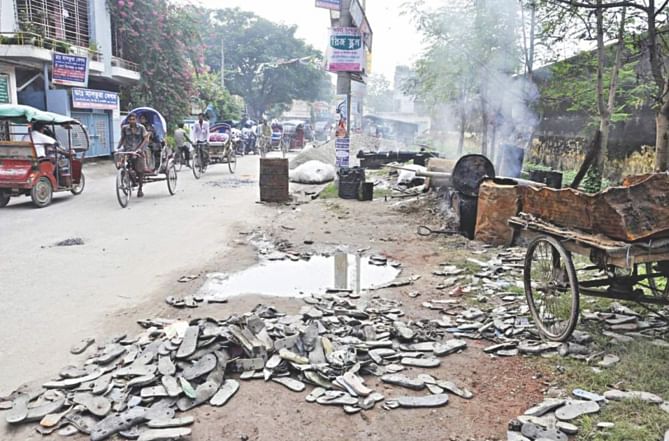Cutting road repair cost at the cost of people's health
Cutting road repair cost at the cost of people's health

Discarded rubber and sponge sandals are being burnt instead of wood and diesel to melt bitumen to repair the potholed roads under the municipality, exposing the townspeople to serious health hazards.
Recently the municipality authorities have taken steps to repair different roads that have remained in awful conditions for years.
But the initiative has turned nightmare for passers-by and commuters as burning of waste rubber sandals emit huge black smoke, making it tough for nearby people to breath.
During a visit to see the repair work of Paharpur-Lilymoar road under the municipality on Thursday, the correspondent found black smoke engulfing the area as plastic sandals were being burnt to melt bitumen.
"They can use husk of paddy or other things as fuel to heat up the bitumen. I can't understand why they are using these sandals for the purpose," said Azgar Ali, a resident of Paharpur in the municipality.
Thrown away sandals were also found piled up in front of Dinajpur municipality office complex as the authorities collected it to use as fuel to melt the bitumen for road repair.
Jahangir Alam, mayor of Dinajpur municipality, said, "The sandals are being used to melt the bitumen to save cost in repairing the roads as there shortage of fund for the purpose."

Tanvir Siddiqui, executive engineer (acting) of Roads and Highways Department of Dinajpur, said, "At least 150 degree Celsius temperature is required to melt the bitumen. Usually wood, diesel and residues of crops are used as fuel for the purpose, in view environmental issue."
Dr BK Bosh, an asthma specialist, also director of Bangladesh Atomic Treatment Centre, said, "Burning of waste plastic materials aggravate respiratory ailments, such as asthma and emphysema. It causes rash, nausea, and headache, and poses the risk of heart disease, damage in kidney, liver, and the reproductive system."
"The burning of polystyrene polymers such as foam and plastics in different forms releases styrene in vapour form. Long term exposure to styrene can affect the eyes, mucous membranes and central nervous system," he added.